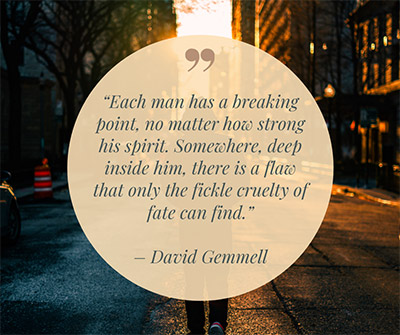Breaking Points
# when its all too much to handle
Breaking Points, unfortunately everyone experiences these at certain times in their lives, some more often than others. So what happens and what can you do when you reach a breaking point moment in your life? As a trauma counselor I have always stated, it's not the event or situation itself causing the trauma, it's how you processed through it, your resilience, your support system, etc. With breaking points or extreme stacks of stress, again It’s not always what happens to us, but what we do with what comes at us that matters.
I think it is safe to say that so far 2020 has certainly pushed most, if not all ,of us at some point to their breaking point. With the pandemic still raging strong, record number of jobs lost, businesses closed, homes lost, devastating hurricanes, fires and more, it seems 2020 is testing everyone's emotional limits. And while 2020 is throwing a lot at us, its not just 2020 that throws a lot of life challenges and stressors at us. How many times in your lifetime have you thought, or heard someone else say, “I can’t take this any longer?”
We all face a breaking point from time to time and I can also say that for most, we hit multiple breaking points throughout our life. No one is immune to it, however, learning how to overcome a breaking point is crucial to our mental and physical health. Breaking points no doubt test us on many levels. The good news is with courage, and a bit of resilience, we can turn those overwhelming moments, into defining life moments for the better. Something else I have repeatedly said is “its through our darkest times we often find out light”, it was through one of those “dark times” in my own life that showed me what my purpose was and what I wanted to do with my life.
 Breaking Points Don't Happen Overnight - Everyone has a breaking point and the earlier you recognize the signs, the earlier you can do something about it. Being able to listen to our bodies and put what is being said into context along with pulling out any tools or techniques you have in your emotional toolbox is essential. It can mean the difference between your body functioning normally or shutting down.
Breaking Points Don't Happen Overnight - Everyone has a breaking point and the earlier you recognize the signs, the earlier you can do something about it. Being able to listen to our bodies and put what is being said into context along with pulling out any tools or techniques you have in your emotional toolbox is essential. It can mean the difference between your body functioning normally or shutting down.
Most people fall apart when their stress levels become unbearable (when they hit their “breaking point”). A breaking point is not an isolated incident but usually the culmination of an internal process that includes undelt with or unreseolved tension and stress building up over time, until we have reached the moment that we (our brain and body) had enough. Even though we may notice body fatigue building up over time, we continue pushing and want to “stay the course”. We continuously fail to pay attention to what our body is telling us, which in most cases it’s telling us to stop.
We often don't listen until it’s too late and by that time our body has already taken over. I think for many they feel if they “give in” to what the body is saying that somehow they are less of a person, like they can't handle something they are exected to handle, this is generally a result from our upbringinging. We have been programmed from a young age to be a certain person, act a certain age or way, the whole “be a man” or “suck it up” phrases become far more damaging later in life. Because of this mentality we never learn to "deal with" or how to process our emotions. For others “giving in” shows a sign of weakness in their eyes, again going back to the “be a man” or “we in this family don’t do that”, the “buck up buttercup” phase comes to mind, since that was what was used frequently during my upbringing.
I remember times starting to cry due to overwhelm of emotions and my parents telling me their ever popular phrase of “why are you crying...well stop it or I’ll give you something to cry about”. Way to go mom and dad, way to equip me with skills to process what is going on. And while I dont excuse their behavior, I do now understand they were doing what they experienced, so in a way they truly didn’t know any other way or any better. Mental health info was not big in my house and especially the level of knowledge that we have today. Now all of that explaination boils down to our limited belief(s). Those beliefs that are a result of your past sneaking in. Unfortunately it's something that people continue to think and push them to an even larger or compounded breaking point.
When it comes to breaking points everyone experiences breaking points in a variety, but also distinct ways. Some people crumble being under pressure, and they immediately shut down at the smallest of stressors. Others ignore the symptoms, letting things build up until they explode. For some individuals they may seem to overreact to situations that might feel normal to anyone else.
Deepak Chopra has said that Chronic Stress is like hearing a dripping faucet, "First you notice it, then you get irritated and finally you can't stand it anymore. By the time you get to Stage 3, its time to fix the drip."
 Stress or stressful moments affect us one drop at-a-time until we can’t tolerate it any longer. Once your body reaches it’s limit your brain is triggered to respond, throwing you off balance. Deepak goes on to identify 3 stages that turn the “dripping faucet” into a make-or-break situation.
Stress or stressful moments affect us one drop at-a-time until we can’t tolerate it any longer. Once your body reaches it’s limit your brain is triggered to respond, throwing you off balance. Deepak goes on to identify 3 stages that turn the “dripping faucet” into a make-or-break situation.
Stage 1: You are aware of being under pressure, but still feel centered.
Stage 2: Stress clouds your judgment, and you start to lose control. You have to make a conscious effort not to respond with anger, anxiety, or impatience.
Stage 3: You can’t cope any longer, and you explode. You release your tension momentarily but feel embarrassed and regretful.
Stress is cumulative; don’t miss or ignore the signs.
How to Deal With Breaking Points
Like I mentioned above, stress is cumulative. And ironically trying to control every stress event, increases your stress. And when you reach that max stress level, your breaking point is just around the corner. This is when your body just can’t handle the strain any longer. So what do we do, what can we do. Below are a few things to keep in mind:
Adapt Not React
Fighting against what we don’t know or can’t control it’s inherently human. Our brain loves being in charge, we want to be in control of every situation, but some situations are truly out of our control and we have to be ok with that and find ways to work around those moments.
Take time to acknowledge your emotions, anger, fear, sadness etc. This self-awareness is critical to the process. You want to be able to pause and reflect , allow yourself to connect with your emotions but not react to them. As you learn to acknowledge and observe your thoughts rather than ignore or give them the wrong attention. You can better understand when something is happening, why it is happening, and you can give the appropriate response or attention to resolve them at that moment rather than ignoring them to only bring you to a breaking point later.
.
Resilience Requires Practice
Resilience is a skill that you develop through time, thus recovering from a breaking point can also take time and practice. Remind yourself (remember your mind will be running wild with all sorts of made up scenarios) of similar past situations that you were able to overcome: “I’ve been there, done that. I can do it again.” Use your supports, use your skills from past situations, open your toolbox of resiliency to overcome.
Turn Your Mind Into Your Ally
The routines and ruts we get into with our daily lives can debilitate our mind, leaving us feeling like we are living on autopilot. Autopilot is that feeling that we are just going about our daily life, doing the routine habits and work, not really putting much thought into what we are doing. We are just “existing” and going through our daily life as “this is just my life”, and just accepting what happens to us throughout the day. Practices such as meditation and mindfulness can help turn off autopilot and allow your mind and body to talk to each other and give you the ability to listen. This practice allows you to start strengthening your mind. Once that happens you start to become familiar with your body's talk so that you can better handle those unexpected events, stressful moments or uncomfortable situations you may find yourself in. Embracing your own vulnerability will make you stronger. Don't be afraid to slow down, listen, process what is being said and act accordingly. Instead of “existing” you might find yourself “living”.
Utilize Your Support System
You don’t need to fight your breaking point alone. We are as strong as the strength of our relationships. Who do you trust? Who, What or Where can provide a calm space to help you clear your mind? If you feel you don't have anyone who foots the bill, look into a success partner, life coach, accountability coach etc. There are many options out there. Also look into support/social groups and don't forget that most cities have some sort of support resource options at little to no cost to reach out to. These days there are even online/apps options with people you can reach out to. Having support, and a variety of support options, can help make things easier to deal with when various life challenges come into your path.
 Breaking points, they can become a part of life, but they dont have to. Being able to understand what our body is telling us, how to speak to it and process through, require skills that take time to learn and use. In most cases we need to seek help, but seeking help is hard for most to do and admit to, leaving most just stuck with the feeling of frustration that adds to their stress levels, ultimately bringing them to the breaking point. Its ok to ask for help, asking for help does not show weakness, it shows you are human.
Breaking points, they can become a part of life, but they dont have to. Being able to understand what our body is telling us, how to speak to it and process through, require skills that take time to learn and use. In most cases we need to seek help, but seeking help is hard for most to do and admit to, leaving most just stuck with the feeling of frustration that adds to their stress levels, ultimately bringing them to the breaking point. Its ok to ask for help, asking for help does not show weakness, it shows you are human.
Learn to take on and process the small bumps life puts in your path. Don't leave them unattended or put aside to "deal with later". Left unprocessed only allows that bump(s) to turn into larger mountains or cliffs that are even harder to manage later.
